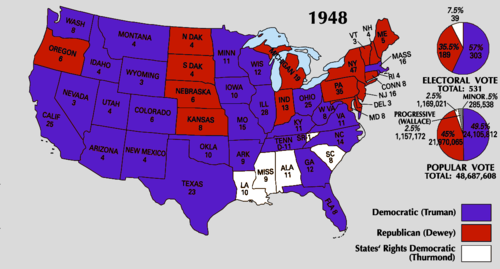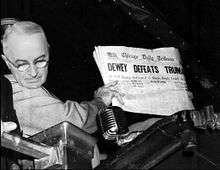United States presidential election, 1948

“Face it, he didn't have a snowball's chance in Hell.”
“Go Dewey, it's your birthday, we gonna party like it's your birthday...”
The United States presidential election of 1948 saw the overwhelming defeat of then-President Harry S. Truman at the hands of Thomas Dewey, the Republican governor of New York and former partner in the law firm, Dewey, Cheatem & Howe. Truman was simply unable to overcome the all-but-universal disgust in which voters held his foreign policy, and was further crippled by the devastating three-way split in the Democratic party.
Nominations
At the outset of 1948, neither party had any difficulty in deciding who their best candidate would be and stuff. The problem was that both parties had decided that that candidate was Dwight D. Eisenhower, who had somehow managed to rise to prominence in the public eye without giving any hint of what his political beliefs were.[2] This led to a frenzied attempt by both parties to get Eisenhower to sign with their team; the Republicans offered him a $30 million contract for ten years, while the Democrats offered a "pay-for-play" contract that was potentially worth twice that amount. However, on the advice of his agent, Drew Rosenhaus, Eisenhower, or "D.E." as he was sometimes known, opted to sit out the 1948 season in hopes of netting an even more lucrative contract in 1952.
Thus, by the time of the conventions, both parties were holding open tryouts to find potential candidates.
Republicans
Once Eisenhower declined to run, several Republicans scrambled to secure their party's nominations, including Senator Robert Taft of Ohio, Governor Harold Stassen of Minnesota, and Thomas Dewey, the Governor of New York.
The race for the Republican nomination was exceptionally fierce, as everybody knew that the Democrats had to nominate either an ultra-liberal wacko, a Southern segregationist, or worse yet, President Truman, who, as one observer put it, "couldn't win an election against a moist towelette." In other words, victory for the Republicans was a sure thing,[3] which meant that once the nomination was taken care of, it would be smooth sailing to the White House, which meant that the campaign for the nomination would be nasty. At one point in the Oregon primary, Dewey was forced to bitchslap the relatively youthful Stassen for "disrespecting" him. In the end, however, it was the unstoppable Dewey who prevailed, due to his wit, charm, and his reputation as a gangbuster in New York.[4]
Democrats
Once they realized that Eisenhower really wasn't interested in being president, the Democrats became despondent, as that meant that the closest thing to a viable candidate they had was President Truman, and it was a universally acknowledged fact that Truman was teh suxxorz. The reason was simple: for some dumb reason he didn't want to kowtow either to the liberalism of the labor unions or the conservatism of the Southern states, which meant he was a moderate.[5]
So, when it became clear that Truman would win the nomination,[6] the liberals, led by Henry Wallace, went off and formed the Progressive Party,[7] while the racists, led by Strom Thurmond, formed the States' Rights Democratic Party,[8] leaving Truman a sad, broken man, vainly attempting to piece together the tattered remnants of what was once the Democratic Party. But 'twas too late, for by then, all the rats had left Truman's sinking ship for the U.S.S. Thomas Dewey Kicks Ass.
Campaign
Dewey's platform had four key planks:
- Agriculture is important.
- Our rivers are full of fish.
- You cannot have freedom without liberty.
- The future lies ahead.
Though critics charged that these were nothing more than blasé platitudes, they were, for the most part, ignored. After all, it didn't really matter what his policies were; Dewey was a well-educated, sophisticated politician from the Northeast while President Truman was a hick with a Southern accent who did whatever he thought was right, resulting in an absolutely disastrous foreign policy. It didn't matter what Dewey's policies were; the populace would vote for him because he wasn't Harry S.[9] Truman. When you've got the election locked up like that, there's no need to be clear about your policies; all you have to do is make sure you're saying whatever it is you think voters want to hear. However, it should be noted that Dewey won the Republican nomination on a platform that that called for expanding social security, more funding for public housing, civil rights legislation, and promotion of health and education by the federal government.[10]
Truman, being a hardheaded moron who simply refused to accept his inevitable defeat, embarked on a whistle-stop campaign that has since gone down in history as the greatest exercise in futility in the history of American politics. He tried to paint the 80th Congress, in which both the House and the Senate were controlled by Republicans, as a "Do-Nothing Congress" that was incapable of getting anything done,[11] but such blatant negative campaigning turned off the voters, who would often mock the president during his speeches across the country with the refrain "Go to Hell, Harry!" He could bitch and moan all he wanted, but the fact was that his policies in Europe, such as the Berlin Airlift, had hopelessly derailed the War on Communism, making a peaceful resolution all the more unlikely, and providing the motivation necessary for hundreds of young atheists to resort to acts of violence to express their hatred of America.[12] How he could have expected any proposed domestic policy to make up for that has befuddled scholars to this day.
Strom Thurmond and the States' Rights Democrats
Thurmond's entry into the race energized the public, particularly in the South, where conservative Democrats were dissatisfied with the new direction the Party was taking. He ran on a platform designed to address the issues that this influential group of voters found important:
- States' rights: States have the right to lynch niggers,[13] darkies, and any smart-ass white kids who try and do stupid shit like registering the aforementioned niggers and darkies to vote.
- Niggers: Not only can we have enough, we now do.
- Education: probably some Jew trick.
- Black nannies: Bangin' 'em and lovin' it!
- Gangsta rap: Not sure. Let me have a listen, sonny.
- Gun rights: Yee-haw!!!
- Lynching: Too messy. Disturbs the young-uns.
- Young-uns: Beat them more often.
- Uppity post-war women: Beat them more often.
- Commies: Beat them more often.
- Taxes: Yet another Jew trick.
Thurmond's traction in the campaign faded however, after he bungled a joke about drawing the line with lynching darkies at "maybe some of the browner guidos." A large portion of the Northeastern vote faded, when it began to dawn upon voters there that Thurmond was probably a bit fucked in the head, and not in a funny way, as was the case with Stalin.
Election night
To the amusement of all observers, Truman still clung naïvely to the hope that he might somehow pull off the upset. It was not until he saw the early edition of the Chicago Daily Tribune (which didn't bother waiting for the election results to come in, since everyone knew that Dewey had the whole thing sewn up) that he finally accepted the harsh reality of his situation — Dewey had won, just like everyone said he would, and all the hard work of his whistle-stop campaign had been in vain.
However, the night was not without surprises for the Dewey campaign. At one point, a young journalist approached the headquarters for the Dewey campaign in the hopes of getting a comment on his landslide victory. When one of the guards told informed the young man that the President was sleeping, the journalist replied, "Well, when he wakes up, tell him he isn't President anymore." This caused several minutes of confusion, until one staffer realized that the journalist was obviously playing some sort of prank (and a very clever one at that), after which every one calmed down. When the journalist continued to insist that Dewey had, in fact, not only lost the election, but the popular vote as well, the staffers went along with it for a while, but after ten minutes of this, they had the journalist forcibly removed from the premises.[14]
Footnotes
- ↑ At the request of Strom Thurmond's estate, his electoral votes have been represented using a pure, undefiled, and chromatically superior shade of white.
- ↑ These days, it is relatively common for politicians to gain power without disclosing any opinions whatsoever about politics, but in those days it was rare.
- ↑ All the polls said so, and polls are never, ever wrong.
- ↑ In Dewey's case, the term "gangbuster" is actually quite literal, as he was known to leave the Governor's Mansion on warm summer nights so he could personally bust a multitude of caps in the asses of the organized crime syndicate that controlled the mean streets of Albany.
- ↑ And as everyone knows, nobody likes moderate politicians, as they require the voters to carefully evaluate and weigh each of their positions on various issues to decide whether to support them, whereas with liberal wackos and conservative wackos, it's a simple 3-second "yes or no" decision.
- ↑ He probably gave blowjobs to the higher-ups in the Democratic Party, as that's the only way to explain how anyone would have agreed to nominate that loser.
- ↑ Not to be confused with Theodore Roosevelt's Progressive Party, or Robert LaFollette's Progressive Party. Jeez, you'd think splinter parties could come up with some original names.
- ↑ Called the "Dixiecrats" for short, because the vast majority of the members of the States' Rights Democratic Party couldn't handle phrases with more than three syllables.
- ↑ The "S" is for "Stupid."
- ↑ This shouldn't be taken as evidence that the modern Republican Party has somehow turned its back on its former principles. Rather, it's evidence that the Republicans of yesteryear had even fewer scruples about lying than today's Republicans.
- ↑ Hence the name.
- ↑ Plus, he supported the creation of a Jewish state in Palestine, marking him indelibly as a sell-out to the Elders of Zion, and creating bitter enemies out of millions of Muslims around the world (and the State Department).
- ↑ In northern states, Thurmond's campaign literature used the word "negroes" instead of "niggers," mostly because those Northern pricks were too self-righteous to admit that they were just as racist as Southerners.
- ↑ Nobody considered the incident noteworthy enough to justify disturbing the president-elect's much-needed beauty sleep, however — he needed his rest to plan how he'd be running the country for the next four years, after all.
| ||||||||
| Featured version: 30 June 2007 | |
| This article has been featured on the main page. — You can vote for or nominate your favourite articles at Uncyclopedia:VFH. | |




